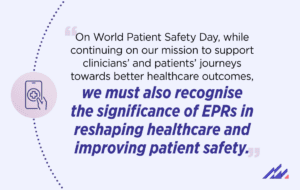Article
How EPRs are crucial to patient safety
As World Patient Safety Day 2023 approaches on 17 September, we at Altera Digital Health recognise the crucial role patients, their families and other caregivers play in how safety is achieved across all healthcare settings. It gives us a moment to reflect on how proud we are to play a role in improving patient safety and patient outcomes in health systems around the world.
We firmly believe that providing healthcare providers with seamless access to patient information is essential in delivering efficient, effective and safe care. In this blog, I want to highlight the significance of EPRs and share real-world success stories from healthcare organisations like Gloucestershire Hospitals NHS Foundation Trust (GHFT), Liverpool Heart and Chest NHS Hospital Foundation Trust (LHCH), Maidstone and Tunbridge Wells NHS Foundation Trust (MTW), Medway NHS Foundation Trust and Bolton NHS Foundation Trust—each to illustrate the transformative impact of EPR implementation. I also will highlight the possible opportunity for the remaining trusts in the UK that don’t currently have an EPR or may have one that needs optimisation to reach the required standard set out by NHS England (NHSE).
Empowering on-the-go patient care
Access to real-time patient information is key in making well-informed decisions. EPRs enable doctors and nurses to access comprehensive medical histories—including allergies, previous conditions and medications—even when they are away from their usual workstations. Quick access to accurate medical information presented consistently can be a matter of life and death. At Gloucestershire Hospitals NHS Foundation Trust, the successful implementation of EPR in the Emergency Department has already demonstrated numerous clinical, administrative and patient benefits.
Tracking board views also provide easy and quick oversight into patients’ current observations and missing or overdue documentation. Clinicians can also receive alerts as new results become available, ensuring timely review. This helps establish clinical prioritisation without opening each individual patient’s record. Any delays in discharging or admitting a patient from ED are also more readily visible, enabling appropriate liaison with staff and services as required. With pressure on beds, clinicians have found the real-time acute admissions lists a huge help.
These lists populate with a team’s newly acquired patients, saving the need to keep a manual list. Patients’ locations are automatically updated so staff are no longer trying to find patients who may have moved. The continuity of care from ED to inpatient also benefits from a single record that covers the entire journey, ensuring serial observations can be reviewed and clinical documentation does not require duplicate data entry, so healthcare professionals can gain a holistic view of their patients’ health—leading to better-informed decision-making.
 Reducing errors and enhancing patient safety
Reducing errors and enhancing patient safety
EPRs play a crucial role in minimising medical errors and improving patient safety. Liverpool Heart and Chest Hospital experienced a remarkable 55% reduction in medication administration errors following the implementation of Altera’s Sunrise™ KBMA closed-loop medication management system. This functionality provides an extra check to support the drug administration process—it confirms the prescribed drug, the physical drug and the patient are all aligned. The success story at LHCH underlines how technology can be configured to adapt to the specific needs of the healthcare environment, ultimately enhancing patient safety. Meanwhile, at Maidstone and Tunbridge Wells NHS Trust, integration with iRefer clinical decision support has just been activated within the Sunrise EPR requesting workflow. Doctors are guided when requesting the most appropriate radiology investigation based on patients’ symptoms and presentations—saving patients from inappropriate tests and consequent delays in diagnosis and treatment.
Positive impact on workflows and patient outcomes
Healthcare providers across the globe have attested to the positive results EPR adoption have on their workflows and patient outcomes. Dr Nabeel Qureshi, Consultant Surgeon and Clinical Lead for EPR at Medway NHS Foundation Trust, said, “The EPR is transforming our workflows and is already having a positive impact on patient safety.” This sentiment echoes throughout the healthcare industry, where EPR implementation has led to improved efficiency, reduced patient lengths of stay and enhanced patient flow. Bolton NHS Foundation Trust’s Acute Medical Department saw a 19% reduction in length of stay thanks to the configuration of an electronic patient acute admission list within its Sunrise EPR system. This list enabled an at-a-glance review of newly admitted patients so clinicians could prioritise their workloads, and patients ready for consultant review were easily identifiable and could have a senior review and were, in many cases, discharged faster than previously.
Improving access to EPRs
As of last year, only 43 acute trusts (20 percent) had an EPR meeting NHS England’s (NHSE) required standard[1], while 138 had an EPR that required “extension/optimisation.” Thirty trusts did not have any EPR. This means many trusts are still missing out on this significant opportunity to improve patient safety.
On World Patient Safety Day, while continuing on our mission to support clinicians’ and patients’ journeys towards better healthcare outcomes, we must also recognise the significance of EPRs in reshaping healthcare and improving patient safety. Altera’s commitment to providing healthcare providers with seamless appropriate access to patient information, anytime and anywhere, has transformed patient care at trusts like GHFT, LHCH, MTW and Medway NHS Foundation Trust—as well as at many others.
Let us continue to embrace technology and innovation, leveraging EPRs to enhance patient safety, reduce errors and provide next-level healthcare to patients worldwide.
To learn more about Altera Digital Health, please click here.
[1] https://www.hsj.co.uk/technology-and-innovation/digitising-all-trusts-by-2025-unachievable-after-700m-cut-government-admits/7035234.article#:~:text=As%20of%20last%20year%2C%20only,planning%20to%20procure%2C%20last%20year.













